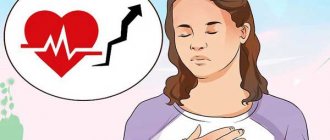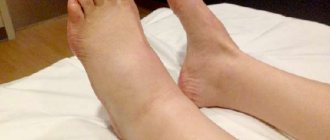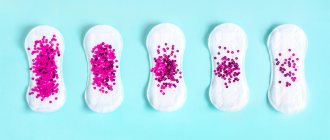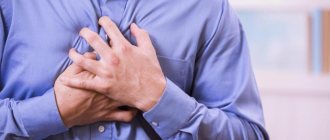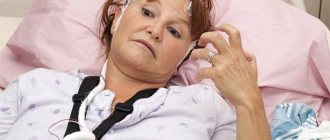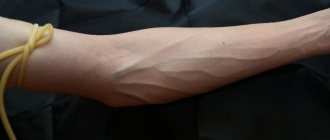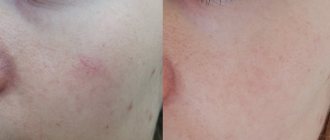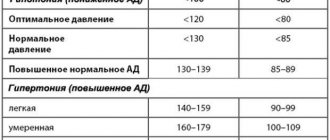What to do if your heart rate changes
What needs to be done in this case.
When the heart rate is no more than 120 beats per minute:
· Give any sedatives to calm the nervous system. For example: Glycine - 1 gram at a time (this is 10 tablets of Glycine Bio or 2 tablets of Glycine Premium).
· Give any blood-thinning drug to prevent the risk of heart attack or stroke - Aspirin, Cardiomagnyl, etc.
· If you have high blood pressure, use antispasmodics No-Spa 2 tablets at a time.
This is the safest way to alleviate the patient's condition.
Screening for people with heart problems caused by alcohol
Patients who have cardiovascular diseases or are prone to developing them and who drink alcohol frequently and in large quantities should definitely be examined.
It is good if diagnostic procedures are suitable at the stage of preparation for coding in a narcology clinic. Then the doctor will be able to tell which option of anti-alcohol therapy is most appropriate, and the cardiologist will prescribe an effective treatment program for the identified cardiac disorders. When identifying alcoholic cardiomyopathy, the following diagnostic measures are used:
- Examination and interview of the addict. The doctor finds out how long ago and what kind of alcoholic compounds the patient has been taking, whether he was previously coded, and whether he underwent therapy for cardiac pathology.
- Study of percussion and auscultation patterns. The specialist listens to heart sounds and taps the chest area. Particular attention is paid to noise and rhythm.
- Carrying out ECG and ultrasound. These diagnostic methods are highly accurate, safe and effective. Based on their results, the cardiologist can easily make the correct diagnosis.
It is very important that a person undergoing diagnosis and planning treatment for heart disease observe the law of sobriety. It is unacceptable to go to doctors during the day and get drunk in the evening.
When is it time to see a doctor
Tachycardia, high pulse and palpitations can lead to serious complications. Remember if:
· heartbeat more than 120 beats;
· systal pressure is increased by more than 20-30 millimeters of mercury;
· the patient is over 40 years old, the risk of blood clots, stroke, and heart attack increases significantly.
you need to consult a doctor. If the condition arose due to alcohol abuse , then it is better to seek the help of a narcologist at home or in a hospital .
The doctor will begin by recording an electrocardiogram, in order to exclude acute conditions, and will cleanse the body after alcohol.
Manifestation of tachycardia after alcohol
Even a small dose of alcohol can worsen the condition of a non-sick person. Tachycardia is not a separate pathology.
In most cases, this is a sign of the development of serious pathological processes, for example, alcoholic cardiomyopathy. Its development is promoted by excessive consumption of alcoholic beverages, as a result of which the sympathetic nervous system is excited.
For most people, this condition develops due to regular drinking for more than one month in a row. As a result, the heart muscle tissue begins to rebuild. Such changes contribute to disruption of the beating of the organ and blood flow throughout the human body.
In the event that the heart begins to pound strongly after drinking alcohol, it is necessary to undergo a full examination, which will help identify the presence of diseases.
According to statistics, in 20% of cases, cardiomyopathy caused by drinking alcoholic beverages provokes the death of a person. The difficulty in carrying out therapeutic activities lies in the fact that a person cannot accept and understand the seriousness of the problem.
Initially, the heart beats intensely in the morning hours. Over time, the attacks become systematic, become longer and cause a lot of inconvenience, and can also be observed during night sleep.
- Joint pain after alcohol is a serious cause for concern
With the development of tachycardia against the background of alcoholic cardiomyopathy, clinical symptoms such as:
- dyspnea;
- dizziness;
- headaches of unknown origin;
- loss of consciousness;
- blood pressure increases;
- fatigue increases;
- frequent mood changes;
- darkening of the eyes.
At an early stage of the development of the disease, only the listed signs will be of concern. However, if the problem is left unattended, irreversible changes will begin in the heart muscle itself.
With a hangover, arrhythmia may appear, accompanied by a change in the nature of contractions: at first the heart beats quickly, then it freezes. If you listen, you can feel characteristic noises. To identify the problem, electrocardiography is prescribed.
The cause of disturbances in the functioning of the cardiovascular system can also be the negative impact on the body of toxins present in low-quality alcoholic beverages.
Gross mistakes
- The use of B-blockers (drugs that deliberately slow down the heartbeat) - used by doctors under the guise of infusion therapy ( drips ) where we administer electrolyte drugs - is only allowed in this case.
- Give emergency medications, for example, Nifedipine, Captopril to lower blood pressure, if the pressure has increased by no more than 20-30 mmHg. These drugs will undoubtedly lower your blood pressure, but they work for no more than 3-5 hours, and then the pressure will creep up again. Allowed if the pressure is very high for the patient, but after consulting a doctor.
Two groups of these drugs are familiar to cardiac patients and are available over the counter. Remember, these drugs will undoubtedly slow down your heart rate and lower your blood pressure - but you will get brain hypoxia, and as soon as the effect ends, all these symptoms will return and you will only make things worse.
This can cause a stroke. Therefore, until there is proper sedation and the electrolyte balance is restored, these symptoms are a protective reaction of the body.
It happens that after a binge and a course of IV drips, the heartbeat remains more than 80 beats at rest. In this case, we prescribe salt preparations Panangin, Asparkam or enhanced nutrition (dried apricots, prunes, honey).
My heart beats fast when I'm hungover, what should I do?
If, against the background of a hangover, the pulse has sharply increased, and the level of cardiac and renal pressure has also increased, first of all it is necessary to take a drug from the group of sedatives - this can be Valocordin or Validol (the first will be preferable). Yes, even if these are not the strongest remedies that exist today, they will help relieve nervous tension, which activates the sympathoadrenal system and forms a vicious circle.
The next step is to take Bisoprolol or Amlodipine (or better yet, Nifedipine). These medications are great at helping normalize your heart rate, but they will only be safe if you use one of them.
We should not forget about simple remedies. For example, drinking plenty of fluids helps to carry out the detoxification function. Of the hot drinks, green tea is preferable, the effect of which can relieve intoxication. If you add mint and lemon to this drink, it will quickly relieve attacks of nausea and replenish vitamin C reserves, which are vital for the body during a hangover.
Helpful information
Find out:
- Rules and features of treating blood pressure from pommel .
- diarrhea and repeated vomiting occur after alcohol abuse and how are these conditions treated?
- What does alcohol poisoning and how does delirium tremens ?
- Why does a patient experience depression after binge drinking and what to do in this case.
- How effective is succinic acid in eliminating hangover syndrome, and how can it be used independently?
Services of our clinic
Detoxification of the body
Detoxification is a process that goes through the human body, eliminating traces of alcohol or drugs.
Alcoholism coding
Effective coding for alcoholism, which will help a person return to a healthy and fulfilling lifestyle
Treatment of alcoholism
High-quality drug addiction treatment in Moscow and the Moscow region at a low price, individual therapy
Addiction rehabilitation
A powerful set of measures leading to complete relief from any addiction, working with the patient in 12 directions
First aid
Most deaths from alcohol poisoning are associated with delayed medical care. If you suspect severe intoxication, you should urgently call a doctor.
Before his arrival:
- do not leave the person alone, even if he has fallen asleep or lost consciousness. If he starts to feel sick, he may choke on the vomit;
- It is better if the patient stays awake; you should not let him fall asleep;
- if he is vomiting but cannot get up, place him on his side to prevent him from choking;
- if there are no problems with swallowing, you can give a sorbent. This will reduce the absorption of alcohol from the stomach.
What not to do:
- give a person to drink alcohol, coffee, milk, etc.;
- send him under a cold or contrast shower or into the bath;
- try to induce vomiting, rinse the stomach (danger of internal bleeding);
- force him to walk, stand on his feet (it’s better to sit him down or lay him down comfortably).
In cases of alcohol poisoning, people most often die due to breathing problems. It is associated with the accumulation of vomit in the oral cavity and trachea. If a person is not breathing, is wheezing, or wheezing, the upper respiratory tract needs to be cleared. To do this, place him on his side, and remove the vomit with his fingers without pushing it deeper. If the victim is unconscious, he should lie so that the tongue does not fall into the larynx.
Effect of alcohol on the brain
All organs suffer from the negative effects of alcoholic beverages. But it’s the neurons—the brain cells—that get the most. People know how alcohol affects the brain from the feeling of euphoria, high spirits and relaxation.
However, at the physiological level, at this time, destruction of cells of the cerebral cortex occurs even after small doses of ethanol.
- Normally, the blood supply to the brain occurs through thin capillaries.
- When alcohol enters the blood, blood vessels narrow and red blood cells stick together, forming blood clots. They clog the lumen of the brain capillaries. In this case, the nerve cells experience oxygen starvation and die. At the same time, a person feels euphoria, without even suspecting the destructive changes in the cerebral cortex.
- Capillaries from congestion swell and burst.
- After drinking 100 g of vodka, a glass of wine or a mug of beer, 8 thousand nerve cells die forever. Unlike liver cells, which can regenerate after alcohol withdrawal, nerve cells in the brain do not.
- Dead neurons are excreted in urine the next day.
Thus, under the influence of alcohol on blood vessels, an obstacle to normal blood circulation in the brain is created. This is the cause of the development of alcoholic encephalopathy and epilepsy.
A postmortem autopsy of the skull of alcohol abusers naturally reveals destructive pathological changes in their brain:
- reducing its size;
- smoothing of convolutions;
- the formation of voids in place of dead areas;
- foci of pinpoint hemorrhages;
- the presence of serous fluid in the cavities of the brain.
With long-term abuse, alcohol affects the structure of the brain. Ulcers and scars form on its surface. Under a magnifying glass, the brain of an alcoholic looks like the lunar surface, pockmarked with craters and craters.

